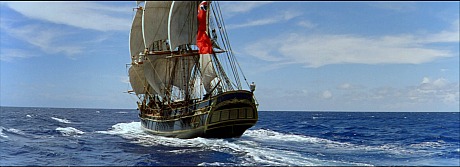The Mutiny on the Bounty Bluray (’62 version) streets next Tuesday (11.8). I’ve got a comp coming in the mail, but for now DVD Beaver‘s Gary Tooze is calling it “quite an upgrade depending on your discerning eye or system size” and “really sweet” and “jaw-dropping with vibrancy…a higher degree of sharpness via the impressive 2.75:1 widescreen presentation….a very film-like viewing.”

I’ve said two or three times in the past that it’s not the movie (although many portions of it are quite good) as much as the resolution. This mostly-good, partly-problematic sea epic was shot in Ultra Panavision 70, meaning it will look exceptionally vibrant and detailed in high-def.
I wrote the following about the DVD version in August 2006:
“Say what you will about the ’62 Bounty — historical inaccuracies and inventions, Marlon Brando’s affected performance as Fletcher Christian, the floundering final act. The fact remains that this viscerally enjoyable, critically-dissed costumer is one of the the most handsome, lavishly-produced and beautifully scored films made during Hollywood’s fabled 70mm era, which lasted from the mid ’50s to the late ’60s.
“Roger Donaldson‘s The Bounty (’84) is probably a better Bounty flick (certainly in terms of presenting the historical facts), but the ’62 version has more dash and swagger. It has a flamboyant ‘look at all the money we’re pissing away’ quality that’s half-overbaked and half-absorbing. It’s pushing a kind of toney, big-studio vulgarity that insists upon your attention.
“And the ’62 Bounty definitely has first-rate dialogue and editing, and three or four scenes that absolutely get the pulse going (leaving Portsmouth, rounding Cape Horn, the mutiny, the burning ship).
“You could argue that this Bounty is only nominally about what happened in 1789 aboard a British cargo ship in the South Seas. And you could also say it’s more about early ’60s Hollywood than anything written by Nordhoff & Hall.
The ’62 Bounty “is mainly a portrait of colliding egos and mentalities — a couple of big-dick producers (Aaron Rosenberg was one), several screenwriters, at least two directors (Lewis Milestone, Carol Reed) and one full-of-himself movie star (Marlon Brando) — trying to serve the Bounty tale in ’60, ’61 and ’62, and throwing all kinds of money and time and conflicting ideas at it, and half-failing and half-succeeding.
“Seen in this context, I think it’s a trip.”









